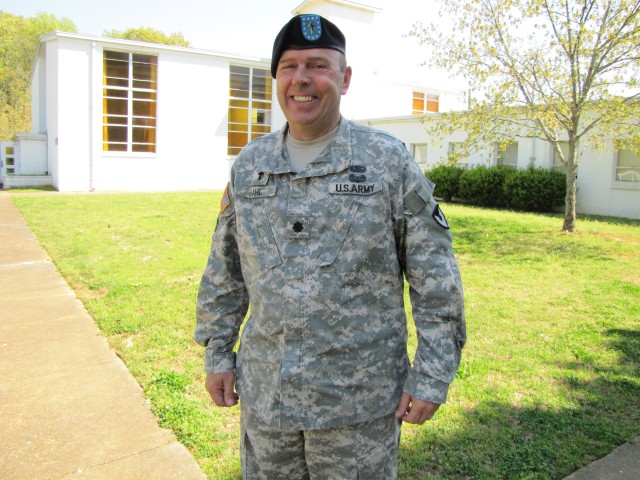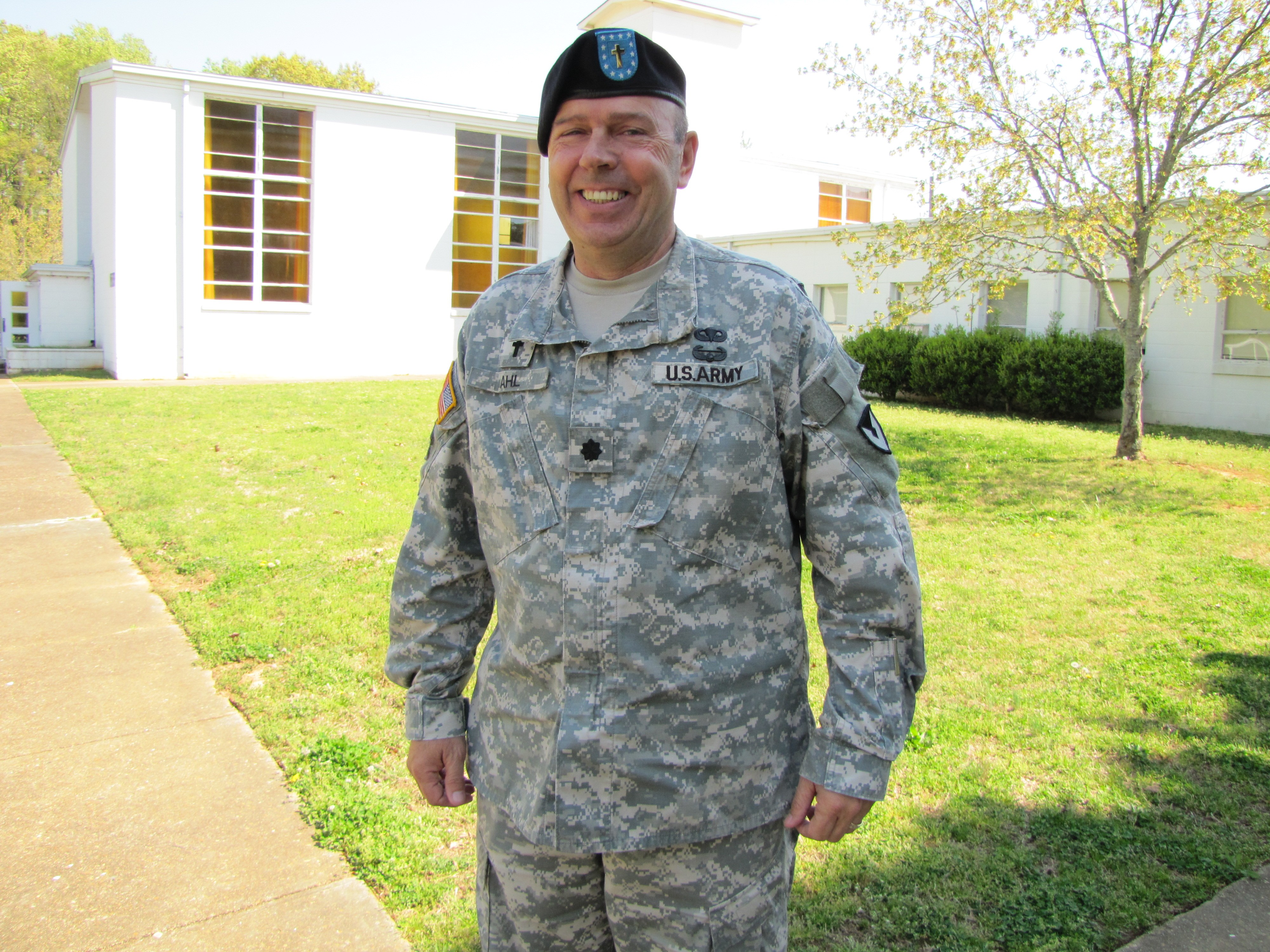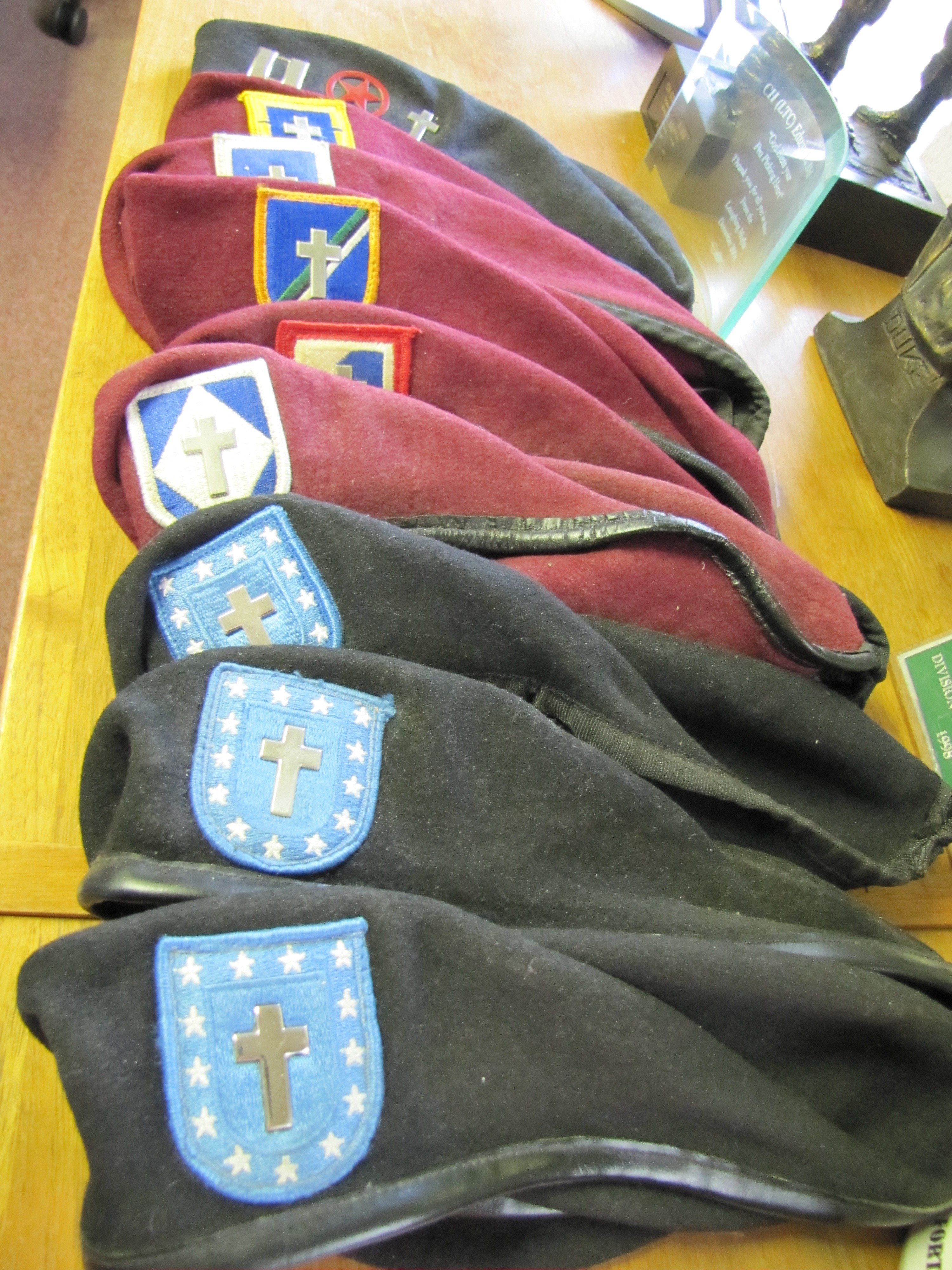REDSTONE ARSENAL, Ala. -- "God bless ya!"
Those words -- most often expressed with excitement and joy, and marked with a smile - follow Chaplain (Lt. Col.) Ed Ahl wherever he goes. For him, they are a sincere greeting and an equally sincere farewell to the Soldiers, civilians and contractors he sees every day in his position as the chaplain for the Aviation and Missile Command.
Ahl, 59, is a chaplain with Soldier capabilities. As a spiritual leader for 26-plus years, he has conducted services, counseled Soldiers and Army employees, and provided prayerful insight for Army commanders. But, as a Soldier, he has also jumped out of helicopters, survived the challenges of training in a mock prisoner-of-war camp, provided impromptu medical aid to injured Iraqi prisoners, and experienced the same harsh environmental conditions and mission challenges faced by the Soldiers he serves.
"I tell young chaplains that the schools you go to and the experiences you have with your Soldiers makes a difference because they give you credibility. If you go through the things your Soldiers go through then they can really put their trust in you," Ahl said.
"You want to be a Soldier's chaplain, not a chaplain's Soldier. Whichever unit I am serving with, those are my Soldiers, and if they are going to talk to me they have to see me and know that I am there with them and for them."
The challenge of being a Soldier's chaplain wasn't difficult for Ahl. He thrives on wearing the chaplain's uniform, being around Soldiers, and sharing God's message with Soldiers and Army employees, both on and off the battlefield.
"I'm a nuts and bolts, get-me-in-the-mud type of guy," he said. "That's my Soldiers. That's me."
He is also a three-time war veteran. He is the only Vietnam veteran who is a chaplain currently on active duty, although his service branch during Vietnam didn't wear the green suit.
"My draft number in 1968 was 15 and I was flunking a college course," he recalled. "So, I enlisted in the Navy in April 1969. I got my draft notice when I was at boot camp."
Ahl's love of the Navy stemmed from his father's service as a Navy tail gunner for the TBF Avenger Torpedo airplane in the Pacific theater during World War II. He soon found himself in the same Pacific theater, serving on the Navy nuclear cruiser USS Long Beach that was stationed for nine months just 20 miles off the coast of Haiphong Harbor in North Vietnam. The cruiser worked in waters 400 miles north of friendly troops.
"I was a radar man with an electronic warfare specialty," Ahl said. "We were controlling bombing missions into North Vietnam and our fighter aircraft were shooting down their aircraft.
"I was the supervisor for a watch section that looked for and detected enemy radar sites. I had to be able to tell what type of radar the enemy had, what it did and what its range was. Those radars controlled enemy fighter aircraft and we wanted to destroy them."
Enemy radar sites were located in heavily populated areas of North Vietnam. Ahl said his cruiser was responsible for at least two confirmed direct hits and several unconfirmed hits on radar sites.
During their mission, the USS Long Beach also rescued a Navy Seal team ambushed in an attack
that killed their commander. The team swam 10 miles out into the Pacific Ocean, with their commander's body among them, and then was rescued by a cruiser helicopter.
Ahl left the Navy in 1973, returning to college.
"I really missed the military. So, I decided to join the Navy Reserve. I was in school in California and the nearest unit was in Oakland, Calif.," Ahl said. "That was too far away. So I joined an Army Reserve combat engineer unit that was only 10 miles away. I was a demolition sergeant, and I had a blast blowing things up."
But a career layoff changed Ahl's path, finally leading him where he had felt God's calling as a teenager.
"God had called me to preach when I was 17," he said. "But I was a shy, bashful kid and there was no way I was going to get up in front of people. I ran and ran and ran. But the Lord finally got me where he wanted me and I went to seminary."
While he attended Oral Roberts Seminary in Tulsa, Okla., Ahl was also training as a forward observer with an Army Reserve field artillery unit. After seminary, he applied to be a Navy chaplain and was not accepted. He then applied and was accepted by the Army's Chaplain Corps.
"God didn't call me to be a Navy chaplain. He called me to be an Army chaplain. But the Navy had better uniforms," he said.
At age 37, Ahl's journey as an Army chaplain began, providing him with many opportunities to become both a better spiritual leader and a better Soldier. His first chaplain assignment took him to Fort Drum, N.Y., where he trained with a light infantry battalion.
"I didn't realize how much time I would spend in the field," he said.
"I spent 270 days in the woods training with my Soldiers. I did lots of field services. I was so excited to have all these guys. I would have anywhere from 10 to 100 Soldiers at a field service.
The chaplain's assistant and I would walk out 20 miles to see the troops. We would find them in the middle of nowhere so that we could bring them a service and minister to them. I was always able to find us a ride back."
Ahl's first war as an Army chaplain was Desert Storm with the 87th Mountain Battalion of Wertheim, Germany.
"We were a logistics element that followed in after the invasion. We saw burning tanks, burning bodies and burning trucks," Ahl said. "We captured 15 to 20 Iraqis. But we had no military police or medics. Most were walking barefoot in the sand and their feet were devastated. I am a trained combat life saver. We gave them bottles of water and food, but no pork. I put my helmet on the ground and propped their feet. I washed their feet and bandaged their blisters and cuts."
Two of the captives spoke English. They included one Hindu, three Christians and several Muslims.
"When the MPs came to take them away, they shook my hand and were saying 'God bless you' to me," Ahl said.
During the six-month deployment, Ahl spent a lot of time traveling between units that were spread 50 miles in opposite directions.
"I put 5,000 miles on my Humvee. I lived in my truck," he said.
Other assignments included the 11th Army Cavalry Regiment in Fulda, Germany, where he flew with aviation squadron in OH-58s and Black Hawks; and the National Training Center at Fort Irwin, Calif., where he ministered to the Krasnovin Horde, who were Soldiers acting as the opposing forces during Soldier training exercises, and also assisted with the training exercises.
"I had a five-ton expanding van that I used in the field to preach services and show movies. I usually showed a John Wayne movie," Ahl said. "One time we had a visit from Denzel Washington, Sean Astin and Meg Ryan from the movie 'Courage Under Fire.' Denzel Washington sat in on one of the services."
He also served with the 1st of the 504th Airborne Infantry Battalion, the 325th Infantry Brigade and the 160th Special Operations Aviation Regiment of Fort Campbell, Ky. While with the 160th, Ahl attended Survival, Evasion, Resistance and Escape school at a mock POW training camp.
"I lost 16 pounds in 11 days. It's a school I wouldn't wish on my worst enemy," Ahl said. "I was the oldest graduate of that SERE school by 36 months at 49 years and six months old.
"Training like that was invaluable in serving a unit like the 160th because its Soldiers go behind the line all the time. If they get shot down behind enemy lines, then I get shot down."
Ahl was serving with the 2nd Brigade, 2nd Infantry Division, Korea, when the attacks of Sept. 11, 2001 occurred. He then returned to the National Training Center to train chaplains for assignments in a war zone.
"About 90 percent of the unit ministry teams - made up of chaplains and chaplain assistants - trained for the initial invasion into Iraq went through when I was there," Ahl said.
"I spent three weeks of every month in the field as an observer/controller. I would tell them that 'I don't care how well you preach or minister. I want to know if you're going to survive on the battlefield because it's not a question of 'if' but 'when.'"
Ahl was at Fort Bragg, N.C., with the 1st Corps Support Command when he deployed to Iraq in 2004-05 at age 55. He was stationed at Camp Anaconda.
"We were getting mortared daily. There were numerous attacks," he said. "A 500-pound bomb went off outside gate 3 about 400 meters from my office. One rocket flew over the top of the tent where I led a gospel service. A mortar round hit the headquarters TOC. It was always antsy."
Ahl's unit controlled the coming and going of convoys. He and other chaplains ministered to the Soldiers in those convoys. They worked to provide services and counseling to 10,000-plus Soldiers.
"There were aviation units, maintenance units, National Guard units, Special Operations units and even a Navy Seabee unit. We were doing all sorts of debriefings and counseling. We offered suicide counseling, too, because we had a couple of suicides," he said.
"There was an Air Force hospital there where we visited Soldiers two or three times a week, and even visited with little kids who had been hit by a bomb or shrapnel. I would walk around and greet Soldiers with 'God bless you' and they would pour out their heart to me. I couldn't stay in my office because the mission was out there with Soldiers."
During his deployment, Ahl traveled to visit his unit's Soldiers throughout Iraq, including his son David, a signal officer in an artillery brigade, and daughter-in-law Jenny, a Black Hawk pilot. Both are West Point graduates who were deployed at the same time as Ahl.
"My wife Jane has three stars in her window," Ahl said, referring to the Blue Star Service Banners that families hang in their window during a deployment.
When he returned to the U.S., Ahl served in assignments as the deputy corps chaplain for the 1st Airborne Corps, Fort Bragg, N.C., and then as deputy installation chaplain at Fort Bliss, Texas, before being assigned to AMCOM.
"When I learned that (Maj.) Gen. (Jim) Myles (AMCOM commander) was an old Nightstalker, then I really started to look forward to this assignment," said Ahl, who has been assigned to AMCOM for 16 months.
"I'm charged with taking care of all the Soldiers, civilians and contractors for the Aviation and Missile Command, including those at Letterkenny and Corpus Christi Army Depots and the Aviation Command Logistics Center at Fort Rucker. That's about 15,000 folks."
Ahl often walks the halls of the Sparkman Center, greeting employees with "God bless ya!," ministering to and praying with many of them. He also offers counseling to employees and works closely with Myles on spiritual issues.
Ahl, who played club soccer during one assignment in Germany and a year of semi-pro soccer in Florida, now referees AYSO youth soccer games and has volunteered his referee skills with Redstone FMWR. Last year, he was a member of an over 55-year-old softball team that went on to win the Huntsville City Softball League championship in their category.
He and his wife are also raising two adopted children - Sarah,15, and Bruce, 11. Besides David, they also have two grown daughters.
Though he is getting close to retirement age, Ahl looks forward to at least one more Army assignment.
"I'll stay until they throw me out," he said. "I'm not done. I still have a lot to offer Soldiers and young chaplains. And I'm still in good shape."
He wants young chaplains to know that a commitment to the Army ministry is also a commitment to being a Soldier.
"They need to make sure that they have truly felt God's call on their life because a chaplain's job is not easy," he said. "It's not 9-to-5 in a chapel and nice-and-clean living. I have spent plenty of time falling asleep at the base of a tree with a poncho over me. I've held services outside in 130 degree weather and 60 degree below windchill because that's where my Soldiers have been. And sometimes you will find yourself in the middle of a battle."




Social Sharing